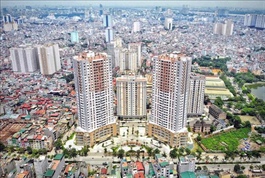Phu Quoc welcomes increasing investment in urban development
Phu Quoc welcomes increasing investment in urban development
Attracting large capital for urban development is essential for Phu Quoc City, which houses Phu Quoc Island – Viet Nam's largest off the southern province of Kien Giang, serving its diverse and sustainable growth after years of investing in the entertainment-resort tourism industry.

A survey by the Viet Nam Institute of Real Estate Studies (VIRES) showed that, in the past 3-5 years, over 90 per cent of investors participated in the market’s tourism-resort realty segment. However, at the moment, the focus of investment has shifted to urban projects boasting transparent legality, with over 60 per cent of investors interested in this segment. The vast majority of them chose long-term investment, expecting that the projects’ prices will increase many times in the coming years.
Vice president of VIRES Pham Nguyen Toan noted Phu Quoc was gradually transforming itself into a profitable investment and settlement destination.
He also singled out shortcomings such as limited land supply, and a lack of new, sustainable, and multi-functional development models in health care, education, commerce, services, finance, and banking.
Vice Secretary of the Viet Nam Urban Planning and Development Association Truong Van Quang said as Phu Quoc is both a marine urban and economic area, it was necessary to attract investment for growth in all of its four pillars – entertainment industry, resort tourism, banking-financial services, and marine economy
Its planning should be sustainable and environmentally friendly, he added.
According to the Viet Nam Institute for Urban and Rural Planning (VIUP), the city’s overall planning orientation to 2040 covers 12 development zones based on landscape features, natural ecology, topographical features, and other conditions.
Forecasting Phu Quoc’s real estate market for 2022-25, Nguyen Van Dinh, Vice President of the Viet Nam National Real Estate Association, said the local urban and residential segment, due to its scarcity and development potential, would still attract the attention of investors across the country, especially regarding mainstream projects with good quality infrastructure, beautiful landscape, and effective business exploitation.





















